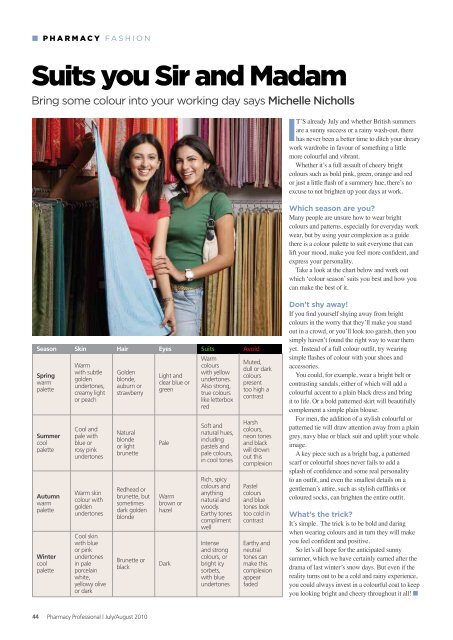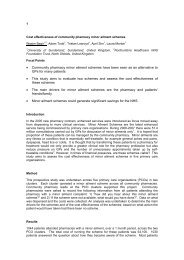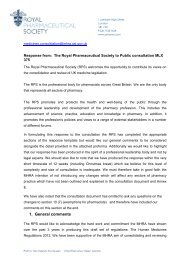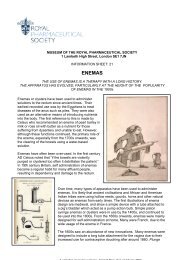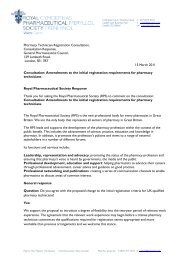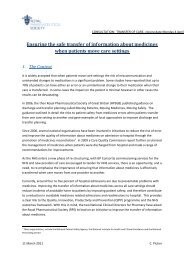victorian Pharmacy - Royal Pharmaceutical Society
victorian Pharmacy - Royal Pharmaceutical Society
victorian Pharmacy - Royal Pharmaceutical Society
You also want an ePaper? Increase the reach of your titles
YUMPU automatically turns print PDFs into web optimized ePapers that Google loves.
p h a r m a c y f a s h i o n<br />
p e r s o n a l f i n a n c e<br />
Suits you Sir and Madam<br />
Bring some colour into your working day says Michelle Nicholls<br />
Season<br />
Spring<br />
warm<br />
palette<br />
Summer<br />
cool<br />
palette<br />
Autumn<br />
warm<br />
palette<br />
Winter<br />
cool<br />
palette<br />
Skin<br />
Warm<br />
with subtle<br />
golden<br />
undertones,<br />
creamy light<br />
or peach<br />
Cool and<br />
pale with<br />
blue or<br />
rosy pink<br />
undertones<br />
Warm skin<br />
colour with<br />
golden<br />
undertones<br />
Cool skin<br />
with blue<br />
or pink<br />
undertones<br />
in pale<br />
porcelain<br />
white,<br />
yellowy olive<br />
or dark<br />
Hair<br />
Golden<br />
blonde,<br />
auburn or<br />
strawberry<br />
Natural<br />
blonde<br />
or light<br />
brunette<br />
Redhead or<br />
brunette, but<br />
sometimes<br />
dark golden<br />
blonde<br />
Brunette or<br />
black<br />
Eyes<br />
Light and<br />
clear blue or<br />
green<br />
Pale<br />
Warm<br />
brown or<br />
hazel<br />
Dark<br />
Suits<br />
Warm<br />
colours<br />
with yellow<br />
undertones.<br />
Also strong,<br />
true colours<br />
like letterbox<br />
red<br />
Soft and<br />
natural hues,<br />
including<br />
pastels and<br />
pale colours,<br />
in cool tones<br />
Rich, spicy<br />
colours and<br />
anything<br />
natural and<br />
woody.<br />
Earthy tones<br />
compliment<br />
well<br />
Intense<br />
and strong<br />
colours, or<br />
bright icy<br />
sorbets,<br />
with blue<br />
undertones<br />
Avoid<br />
Muted,<br />
dull or dark<br />
colours<br />
present<br />
too high a<br />
contrast<br />
Harsh<br />
colours,<br />
neon tones<br />
and black<br />
will drown<br />
out this<br />
complexion<br />
Pastel<br />
colours<br />
and blue<br />
tones look<br />
too cold in<br />
contrast<br />
Earthy and<br />
neutral<br />
tones can<br />
make this<br />
complexion<br />
appear<br />
faded<br />
It’s already July and whether British summers<br />
are a sunny success or a rainy wash-out, there<br />
has never been a better time to ditch your dreary<br />
work wardrobe in favour of something a little<br />
more colourful and vibrant.<br />
Whether it’s a full assault of cheery bright<br />
colours such as bold pink, green, orange and red<br />
or just a little flash of a summery hue, there’s no<br />
excuse to not brighten up your days at work.<br />
Which season are you?<br />
Many people are unsure how to wear bright<br />
colours and patterns, especially for everyday work<br />
wear, but by using your complexion as a guide<br />
there is a colour palette to suit everyone that can<br />
lift your mood, make you feel more confident, and<br />
express your personality.<br />
Take a look at the chart below and work out<br />
which ‘colour season’ suits you best and how you<br />
can make the best of it.<br />
Don’t shy away!<br />
If you find yourself shying away from bright<br />
colours in the worry that they’ll make you stand<br />
out in a crowd, or you’ll look too garish, then you<br />
simply haven’t found the right way to wear them<br />
yet. Instead of a full colour outfit, try wearing<br />
simple flashes of colour with your shoes and<br />
accessories.<br />
You could, for example, wear a bright belt or<br />
contrasting sandals, either of which will add a<br />
colourful accent to a plain black dress and bring<br />
it to life. Or a bold patterned skirt will beautifully<br />
complement a simple plain blouse.<br />
For men, the addition of a stylish colourful or<br />
patterned tie will draw attention away from a plain<br />
grey, navy blue or black suit and uplift your whole<br />
image.<br />
A key piece such as a bright bag, a patterned<br />
scarf or colourful shoes never fails to add a<br />
splash of confidence and some real personality<br />
to an outfit, and even the smallest details on a<br />
gentleman’s attire, such as stylish cufflinks or<br />
coloured socks, can brighten the entire outfit.<br />
What’s the trick?<br />
It’s simple. The trick is to be bold and daring<br />
when wearing colours and in turn they will make<br />
you feel confident and positive.<br />
So let’s all hope for the anticipated sunny<br />
summer, which we have certainly earned after the<br />
drama of last winter’s snow days. But even if the<br />
reality turns out to be a cold and rainy experience,<br />
you could always invest in a colourful coat to keep<br />
you looking bright and cheery throughout it all! n<br />
Taxing problems<br />
Never mind higher rates of capital gains tax, says<br />
Miranda Green. We’ve got some better ideas<br />
THE government is in the biggest fiscal<br />
hole since the end of the Second World<br />
War. It has two main fillers to fix this<br />
hole – cutting spending, and raising taxes.<br />
And because the hole is so wide, and so<br />
deep, it needs all the filler it can get. Taxing<br />
gains on share ownership would have been<br />
anathema to any Conservative government<br />
had this crisis not required some extreme<br />
measures, but the question we must all<br />
address now is, what’s the best way forward?<br />
First, things are not as bad as they could<br />
have been. As we go to press, the details<br />
of the Emergency Budget have not been<br />
released but an increase in CGT on shares<br />
is almost a nailed-on certainty. The good<br />
news is that the threshold over which gains<br />
are taxed is also a nailed-on certainty to be<br />
higher than the £2,000 limit proposed by the<br />
Lib-Dems.<br />
Having the threshold in place means<br />
you need to sell any assets strategically, if<br />
you can, rather than dumping them all at<br />
once. Eking out the sales of assets over a<br />
few years means you won’t be clobbered,<br />
and those who are married can also transfer<br />
assets to their spouses to use their allowance<br />
too. It also means making full use of your<br />
ISA allowance each and every year.<br />
A good bet<br />
All well and good. But how do you invest for<br />
the future? It’s conceivable that even once the<br />
government deficit is paid down (and even<br />
the most optimistic commentators put that at<br />
two parliaments, even with solid economic<br />
growth), the tax will remain in place.<br />
If you want to play a long-term game,<br />
then the tax breaks on investing in<br />
pensions, while also coming under Mr<br />
Osborne’s scrutiny for higher-rate tax<br />
payers, represent a good bet. There is some<br />
optimism within the pensions industry that<br />
compulsory annuities will be phased out,<br />
which means that investing in pensions<br />
becomes a means of building wealth for<br />
generations, as opposed to the current<br />
situation where the annuity passes to any<br />
surviving spouse when you die, but then<br />
to the government when he or she passes<br />
away. Meanwhile you get tax relief on<br />
anything you save, and if you arrange a<br />
self-invested personal pension (SIPP) there<br />
is a broad range of assets you can set aside<br />
for your retirement.<br />
Interest to investors<br />
Of course, those investments touted by the<br />
government don’t attract CGT. You can buy<br />
government bonds (gilts) to your heart’s<br />
content, as long as your heart is content with<br />
solid, but deeply unspectacular, returns.<br />
And the income is taxable as well. National<br />
Savings & Investments, including premium<br />
bonds, do not attract tax but the only<br />
product that might be of genuine interest to<br />
investors, given that most economists predict<br />
that price inflation in the UK is inevitable,<br />
is an index-linked certificate. If they are<br />
wrong – entirely possible – then deflation<br />
does not eat into your capital – those kind<br />
types at NS&I ignore its effect and add on<br />
the guaranteed element of interest.<br />
But the short-term presents more<br />
problems. Some investable items do not<br />
attract capital gains because the Revenue<br />
classes them as ‘wasting assets’. Fine wine<br />
is one – it’s easy to invest via a broker<br />
like Farr Vintners or specialist investment<br />
company like Premier Cru. Top-class claret<br />
returns have been about 15% per year on<br />
average over the past decade, but do trade<br />
with a reputable company.<br />
It’s a similar story with some antiques,<br />
including some classic cars, and specialist<br />
items like classic toys, and again seek advice<br />
before investing.<br />
In times of crisis investors flock to gold,<br />
and the price is already looking frothy. But<br />
if we see the return of high inflation then<br />
gold is a good hedge against it. Holding<br />
sovereigns is a tax-efficient way of investing<br />
because they are still treated as circulating<br />
currency (try that at Tesco…) so there’s no<br />
capital gains tax.<br />
Another way to play the stock market<br />
without physically buying and selling<br />
shares, and therefore eating up any<br />
allowance you have, is spread betting.<br />
Financial spread betting is free from CGT,<br />
stamp duty and commission – the company<br />
takes its ‘margin’ from the spread. Here’s<br />
how it works. A spread betting company,<br />
such as Cantor Index, quotes a price for<br />
Acme plc of 100p-101p. The difference is<br />
the spread between the buy and sell price.<br />
If you think Acme is going to plummet,<br />
you sell at 100p, with your bet pegged to<br />
the price per penny it falls. So if you sell at<br />
£5 per point, and it falls to 80p, you have<br />
made £100. But if it rises, and you decide<br />
to close your bet at 105p, you have lost<br />
£25. Potential losses while shorting are<br />
theoretically limitless, while losses betting<br />
on a rise are limited to the stock falling to a<br />
value of zero. In practice, you either need to<br />
monitor your bets closely, or set stop-losses<br />
– limits that you set which ‘knock out’<br />
your bet to limit your loss. You can trade a<br />
wide variety of assets, from commodities<br />
to foreign exchange, equity indices like the<br />
Dow or FTSE, and individual stocks.<br />
Spread betting companies are reporting a<br />
massive rise in enquiries from ordinary folk<br />
who have no knowledge or experience of<br />
trading products like these, but the bookies<br />
are viewing it as a once-in-a-lifetime<br />
opportunity to help people and drive more<br />
customers into the asset class. My advice is<br />
don’t rush in, but don’t be too afraid to tread<br />
either. n<br />
44 <strong>Pharmacy</strong> Professional | July/August 2010<br />
July/August 2010 | <strong>Pharmacy</strong> Professional<br />
45


